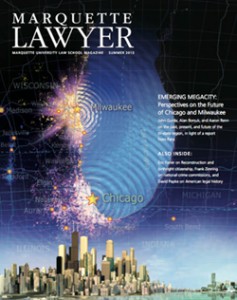Barrett: Streetcar Plan Is a Bet on the City’s Future
“I’m betting on the future of this city, and I’m saying we have to invest.”
The specific investment Milwaukee Mayor Tom Barrett was speaking of during an “On the Issues with Mike Gousha” event at Eckstein Hall on Tuesday is the proposed streetcar that would serve parts of downtown Milwaukee.
Barrett has been an energetic advocate for the streetcar plan, which has become a political controversy of a major order. The proposal appears to be coming to an important point (but not a final decision), with two votes scheduled for Wednesday by the Milwaukee Common Council that would create tax incremental districts in the area to be served. The districts would go far to make financing feasible. But supporters are saying that, even if the streetcar wins, there very likely will be a second round of voting in February, as well as other possible avenues of opposition to pursue.
Barrett told a full house in the Appellate Courtroom that downtown Milwaukee has seen a boom in development and that the streetcar would help continue that. He showed photos of major business projects underway and said 800 new residential units are being readied for the market. “I want that momentum to continue,” the mayor said.

